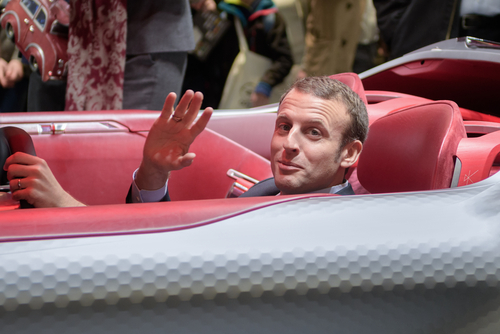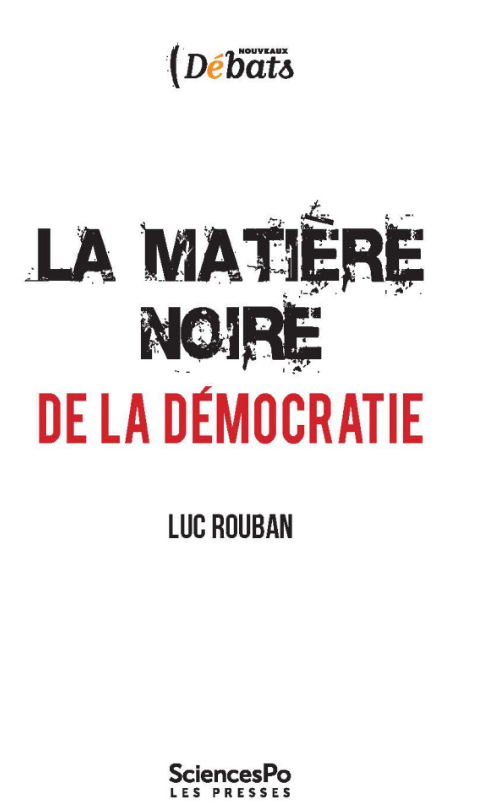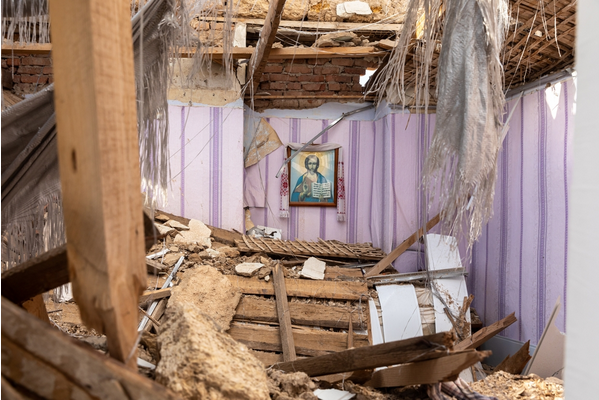

Informational Autocrats
13 February 2020
Cogito 9
13 February 2020In his latest work, La matière noire de la démocratie, Luc Rouban, a researcher at the Centre for Political Research (CEVIPOF), puts forward the argument that the Gilets Jaunes movement goes well beyond economic demands, and is not the expression of an emerging populism. Following an analysis of numerous polls, surveys, and the results of the Grand débat national (National Debate), he interprets the movement as the manifestation of a deep social and democratic malaise.
Why do you talk about a ‘‘Dark Matter of Democracy’’?
Luc Rouban: In this work I have attempted to evaluate the results shown by the Cevipof Political Confidence Barometer on the state of democracy in France, and simultaneously undertake the intellectual challenge of going beyond the sterile debate between Macronism and populism currently weighing on our deliberations. In astronomy, ‘‘dark matter’’ is the invisible mass that structures the universe and determines the trajectory of the galaxies. Metaphorically speaking, the dark matter of democracy refers to the anthropological structures that organize our relationship to politics. Consequently, it is not enough merely to observe the weakened political trust in our institutions. I show how this trust can be found in two different modes that are highly distinct socially. Lower-income-class groups base their trust on relationships that are close at hand, on flesh and blood people who can be touched, seen and heard. This political culture appeals to direct democracy and may explain why mayors are the elected officials that enjoy the highest trust ratings. On the other hand, the upper and middle classes value professional competence and social skills entailing complex institutions, such as the European Union, which involves distancing politics through representative democracy entrusted to proxies.
What do lower-income groups think?

Emmanuel Macron inside the concept car Trezor (Renault) at the Paris Motor Show 2016. © Frederic Legrand – COMEO/Shutterstock
L. R: The Gilets Jaunes crisis has revealed the transformation of our relationship to politics for a large number of working- and middle-class groups. The latter are not only challenging the results of public policies, but even more the purpose of ordinary dissent. Their intention is to protest a lack of political power, as they have not benefitted from the economic and social independence presumed by Macronism’s neoliberal reforms. And current events have confirmed this analysis. Jacques Chirac has clearly enjoyed exceptional popularity since his death because he was the anti-Macron, the president of proximity who did favours for modest people, even if it came along with clannish and clientelist political practices. He embodied a paternalistic political style that is far from the kind of managerial or economic governance favouring a utilitarian handbook in which ‘‘winners’’ are distinguished from ‘‘losers’’, a classification dear to yuppies as long as they remain in the former group. The dark matter of democracy is precisely what the Gilets Jaunes have shown: everyday life in society, consisting in many expectations and dashed hopes, downward social mobility, financial constraints, and being relegated to insignificance on a daily basis. These life experiences are then translated into political investment (mostly in support of the Rassemblement National party) or a loss of interest through abstention.
Is this why you refute the concept of populism in the context of the Gilets Jaunes?
Gilets jaunes au rond-point Ashton, Chaumont, en mars 2019. © Oiseau des bois/CC BY-SA 4.0
L. R : Yes, because to compare this revolt of an insurrectional nature to populism would be giving in to intellectual simplicity and employing electoralist tactics without trying to understand what is at stake, which could be summed up by the question: how can working-class groups be reintegrated into the democratic debate? Indeed, from this starting point a theory of direct democracy and an imperative mandate have been shaped, developing both on the extreme left through La France insoumise and on the extreme right with the Rassemblement National, or in a radical and utopian way, in the Gilets Jaunes’ demands in the ‘‘citizens’ initiative referendum in all matters’’. This demand was clearly expressed in contributions to the Grand débat national (National Debate). It denounces the political elite without really identifying with populism.
For instance, the populism embodied from Gracchus’ plebeian movement in 133 B.C. all the way to Peronism in 1950s Argentina, or Italian fascism, is characterized by a desire to bring together lower-income groups around a charismatic leader. The idea was to celebrate the organic unity of ‘‘real people’’ against all who are considered to be profiteers, whether these are nationals or foreigners. Populism also necessitates the disappearance of political pluralism, a sign of internal conflicts within a society, in favour of either a one-party system or a more or less avowed restriction of public freedoms. Such a restriction could perhaps be found within the Rassemblement National or the extreme right, but not within La France Insoumise or the Gilets Jaunes movement.
The latter differ in their resolve to have no spokesperson or leader, which cost them dearly in the European elections. They have brought together members of the declining lower-middle-class at roundabouts or in demonstrations to protest against fiscal injustice and financial precarity. Furthermore, we have seen that the worst off financially, often immigrants and often living in the outskirts of major cities, have been notably absent from the movement.
As for the criticism of the elite, it is natural and healthy in any democracy to be able to question its leaders and how they are selected. ‘‘Populism’’ has become a catch-all denomination for any contestation of the capitalist order. This boils down to saying that the clash between ‘‘progressivism’’ and ‘‘populism’’ is summed up by the opposition between those who benefit from the system and those who endure it. This proves that the class struggle is not over, although it no longer follows along the lines of professional sectors and may lead to radicalism on both the left or the right.
Then why do you equate Macronism and the Gilets Jaunes?
Tours – Manifestation des Gilets Jaunes – février 2019 © GrandCelinien/ CC-BY-SA-3.0
L. R :Because they are two sides of the same coin: the co-opting of representative democracy. While it remains a form of neoliberalism that has become milder over time, the Macronist doctrine strives to explain how and why France must finally adapt to the globalised capitalist order. The political space is reduced to this utilitarian adaptation while deploring that some have not been so lucky. It is a classic example of the probabilistic argument, the main goal being to bring about an overall improvement for all of society, even if it means compensating the damages some have experienced through ‘equality’ policies. This is clearly the source of anger and violence that has grown among the Gilets Jaunes, a feeling of not being understood in their everyday lives. But as for the Gilets Jaunes and those who contributed to the Grand débat national, their demand for immediate political action, with constant control in a form of direct democracy exercised on all territorial levels – also rejects political efforts in favour of an absolute, citizen-based utopia. This presumes that citizens are omniscient, that their opinions surpass scientific knowledge, which are considered a product of social constructions, and that the common good cannot come from long, complex debates between different interacting interests mediated by professionals. We are confusing science with politics and ignoring the complexity of the world, which is itself the source of all totalitarianism. With Macronism as with the Gilets Jaunes, we are witnessing a lack of distinction regarding politics, assimilated to economic order in the former case, and immediate satisfaction of needs and desires in the latter.
How can we get beyond this impasse?
L. R :We must reform political efforts and make it clear that difficult societal, environmental and social questions cannot be resolved through participatory processes or referendums, but often call for a nuanced response depending on the context of implementation. In that sense, I would say, it does not seem outrageous to have professional politicians, provided that they are conscious of the landscape and are held accountable to it. We have been overly critical of political parties, who for the most part, under the Fifth Republic, held the role of recruiting modest candidates, and forming militants. Recruiting directly from civil society means either enlisting influential people who can afford to get involved in politics, or randomly selecting candidates would simply listen to the experts and serve as a mouthpiece for decisions made elsewhere at a higher level. The crucial point is to re-establish people’s trust in political institutions. To do this, we need to bank on proximity and initiate a new policy of decentralisation to get us in step with what already exists in a good many European countries. The crisis currently experienced by mayors in rural communities should alert us to the need to bring citizens closer to their elected officials. But in order to do so, we must also prepare our citizens from a young age by providing them with an adequate grasp of legal and scientific matters. The level of knowledge in terms of political institutions is far too low. Last but not least, politicians must exhibit greater modesty and restraint in their conduct. The French people want a political class with the highest ethical standards, like in Scandinavia. The example must come from above.
Interview by Marcelle Bourbier, CEVIPOF
Luc Rouban is a research director at CNRS and at the Centre de recherches politiques de Sciences Po (CEVIPOF). His current research is focused on the transformation of elites and democracy.
Luc Rouban, La matière noire de la démocratie, Presses de Sciences Po, 2019
Luc Rouban, Pascal Perrineau (dir.), La Démocratie de l’entre-soi, Presses de Sciences Po, 2017.
Luc Rouban, La démocratie représentative est-elle en crise ? , Documentation française, 2018
Luc Rouban, Le paradoxe du macronisme , Presses de Sciences Po, 2018.
See all publications of Luc Rouban



